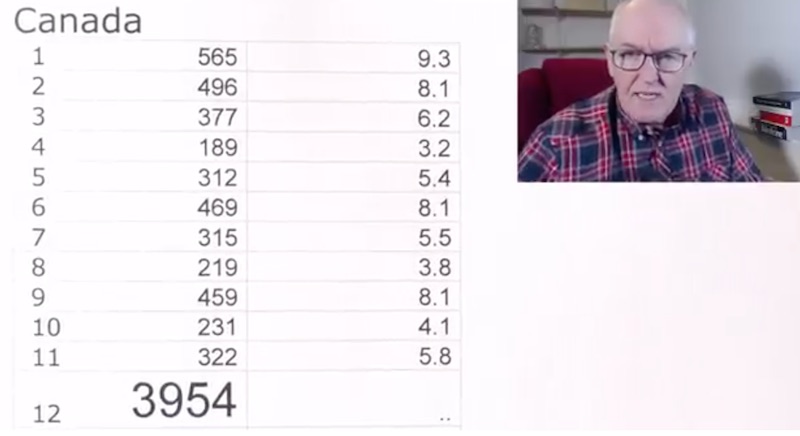Dr John Campbell
Excess deaths in Canada and most western nations remain very high long after pandemic deaths subside

The numbers for 2023 are rolling in and they show a disturbing trend in most of the wealthy nations in the world. In Canada, the United States, and virtually every country in Western Europe, the excess rate of death is astounding and so far unexplained by officials in any nation.
British health researcher Dr. John Campbell shares official data from the OECD (Organization for Economic Co-operation and Development) and wonders why the media doesn’t seem to notice or care.
From the Youtube channel of Dr. John Campbell.
Confirmation of excess deaths in 2023 for US, UK, Canada, Australia, NZ, Netherlands, and Denmark. However, deaths are lower than expected in Poland, Hungary, and Sweden.
OECD data https://stats.oecd.org/index.aspx?que…
Dr John Campbell
Cures for Cancer? A new study shows incredible results from cheap generic drug Fenbendazole

From Dr. John Campbell
You won’t hear much about Fenbendazole from the regular pipeline of medical information. There could be many reasons for that. For one, it’s primarily known for it’s use in veterinary medicine. Somehow during COVID the medical information pipeline convinced millions that if a drug is used on horses or other animals it couldn’t work for humans. Not sure how they got away with that one considering the use of animal trials for much of modern medical history.
Another possible reason, one that makes at least as much sense, is that there’s no business case for Fenbendazole. It’s been around for decades and its patent expired in the early 1990’s. That means it’s considered a generic drug that a pharmaceutical company from India could (and does) produce in mass quantities for very little profit (compared to non-generics).
So Fenbendazole is an inexpensive, widely accessible antiparasitic drug used in veterinary medicine. During the COVID pandemic a number of doctors, desperate for a suitable treatment, tried it with reportedly great levels of success. Over some time they discovered it might be useful elsewhere. Some doctors are using Fenbendazole to help treat late stage cancer. Often this is prescribed when the regular treatments clearly aren’t working and cancer is approaching or has already been declared stage 4.
What they’ve found at least in some cases is astounding results. This has resulted in a new study which medical researcher Dr. John Campbell shares in this video.
Dr John Campbell
Cancer cure experiences

From the YouTube page of Dr John Campbell
UK health instructor and researcher Dr. John Campbell has been hearing anecdotally from cancer survivors who say they’ve been cured by the use of inexpensive drugs ivermectin and fenbendazole. In fact he’s been hearing from so many survivors that he’s calling on cancer researchers to undertake peer reviewed studies as soon as possible.
Viewers share their experiences of their approaches to cancer treatment.
-

 Business2 days ago
Business2 days agoFederal major projects list raises questions
-

 Artificial Intelligence1 day ago
Artificial Intelligence1 day agoTrump’s New AI Focused ‘Manhattan Project’ Adds Pressure To Grid
-

 Business2 days ago
Business2 days agoBlacked-Out Democracy: The Stellantis Deal Ottawa Won’t Show Its Own MPs
-

 International20 hours ago
International20 hours agoAfghan Ex–CIA Partner Accused in D.C. National Guard Ambush
-

 Agriculture2 days ago
Agriculture2 days agoHealth Canada indefinitely pauses plan to sell unlabeled cloned meat after massive public backlash
-

 International2 days ago
International2 days agoAmerica first at the national parks: Trump hits Canadians and other foreign visitors with $100 fee
-

 Crime2 days ago
Crime2 days agoFBI Seizes $13-Million Mercedes Unicorn From Ryan Wedding’s Narco Network
-

 Banks2 days ago
Banks2 days agoFrom Energy Superpower to Financial Blacklist: The Bill Designed to Kill Canada’s Fossil Fuel Sector









